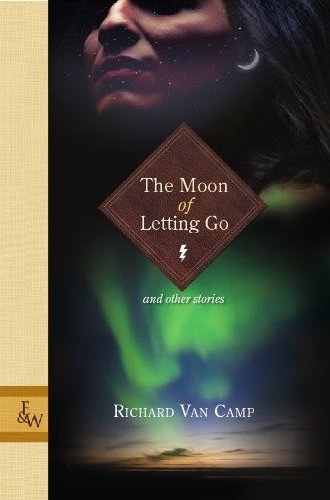A drug dealer with a conscience, straight boys who jog naked at night in a group, and a hit-man who finds himself in a life changing ceremony; yes, there’s everything under the sun (and moon) in Richard Van Camp’s new collection of short fiction The Moon of Letting Go.
A member of the Dogrib Nation of North West Territories, Van Camp is one of Turtle Island’s (Canada’s) premier writers. Published in The Walrus, Descant and Up Here Magazine, Van Camp brings stories from the North to the rest of Turtle Island.
Just as raw, funny and intelligent as the characters in his other works, Angel Wing Splash Pattern and The Lesser Blessed, it’s hard to put down The Moon of Letting Go. Twelve stories in all, some connected via characters, places and events, readers feel like they are hearing town gossip straight from Van Camp’s mouth and want to get involved. At times, I wanted to kill the father who molested his daughter; attend the hockey games the town looks forward to; be one half of the couple who has great makeup sex; and meet the mysterious medicine man who has a town in constant fear.
Throughout the collection Van Camp tackles tough issues including the differences between Aboriginal peoples, dealing with mixed-nation relationships and the pressure to have children. Van Camp shows readers how complex humans are, that there is no black and white, that we can walk the good road while practicing the opposite and vice versa. At times the issues Van Camp addresses seem autobiographical: “I’m quite fair and often invisible to other Indians when I’m out of NWT,” says the narrator in “I Count Myself Among Them.” Van Camp, fair skinned himself, shows how not all Aboriginal people look the same.
In “Show Me Yours” Van Camp proposes a solution to hostility in one community: people wear their baby pictures around their necks. Photos of the innocent bring praise leading to peace then laughter-our best medicine. Natives, Inuit, and whites come together by admiring photos of their past. “There are just so many beautiful babies inside us all,” writes Van Camp. True, we hope everyone would realize this.
In “A Darling Story” Van Camp demonstrates the difficulties of mixed-nation relationships. Lance, a Dogrib, and Shari, a Dene, hang with Duane, a Gitxsan, and Juanita, a Haida: two couples, four different nations, many differences and similarities. Van Camp shows the differences between nations, how different customs are practiced, and how a couple has to negotiate and compromise around their differences — whether partnering in a mixed-race relationship or one that’s mixed-nation.
A large part of “A Darling Story” is the struggle to have a child. With Aboriginal peoples making up only three per cent of Turtle Island’s population there is a push to have children by Aboriginal Elders, communities, and parents for their nations and cultures to survive and continue. Van Camp does not emphasize this pressing reality enough.
Van Camp’s title story, “The Moon of Letting Go,” about medicine man Rattlesnake, and Celestine, a young mother who fears him, reads like a Stephen King story. Yet, though Rattlesnake with his black eyes, long fingernails and rotting teeth is villainized — he is also respected. Van Camp does not cheapen his character, or the story, as do many writers who incorporate stereotypes such as mythical songs and dance with smoke and feathers. There are no pictures burned, or pins and dolls, no eggs with black yoke, or birds smashing into windows. Rather, in one scene, Van Camp describes how Rattlesnake has no fingernail clippings or strands of hair anywhere in his home. “The medicine man had cleaned his home in his own way for anything of his that could be used against him in a medicine war.” Throughout the story Rattlesnake is called “The Devil” and later turns to “uncle” showing that not all is as it appears to be, and that people have many sides to them.
Van Camp’s stories are important, innovative, well-crafted and a pleasure to experience. I loved his endings because of their timing and completeness, but hated them too because I didn’t want his stories to finish. There are many interesting characters that will hopefully appear in future collections or novels. They say a good book is like spending time with a friend; you don’t read Van Camp, you listen to him.—Jorge Antonio Vallejos




